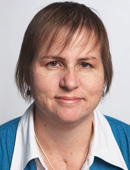
Kimberly B Morland, PhD
About Me
Language
English
Position
ADJUNCT ASSOCIATE PROFESSOR | Environmental Medicine
Education
BA, University of California
MPH, University of California
PhD, University of North Carolina
, United States Environmental Protection Agency, Human Studies Division
Awards
2003
Outstanding Abstract Award
American Public Health Association, Epidemiology Section
2001
Member of Delta Omega
Theta Chapter
2001
Service Recognition Award
U.S. Environmental Protection Agency
2000
Outstanding Abstract Award
American Public Health Association, Nutrition Section
1999
Sidney Kark Distinguished Teaching Award
University of North Carolina
Research
Dr. Morland's research focuses on the relationships that exist between the physical, social and built environments, and human health. She has received national recognition for her work developing methods to evaluate the relationship between the aspects of the built environment (the local food environment) and health behaviors and outcomes. As an environmental epidemiologist, Dr. Morland has a strong interest in applied public health research and develops studies to measure multi-level relationships between individual and environmental risk factors associated with health. In addition, she partners with community groups to develop community driven research. She has received awards for her research from the American Public Health Association and has also been distinguished for her teaching. Dr. Morland has served on the North Carolina Environmental Justice Network Committee and the East Harlem Community Health Committee. Dr. Morland has developed a number of research projects described below.
\r\n\r\nOganochlorines and Metals in New York and the Hudson: Urban Anglers Study\r\nFunded by the Superfund Basic Science Program, this project aims to measure the association between known pollutants found in the Hudson River and New York/New Jersey Harbor and body burden of these contaminants among anglers fishing from these waters. Serum levels of mercury, PBDEs, PCBs, DDT, DDE, and other organochlorines were measured as well as fishing practices and fish intake.
\r\n\r\nRacial Disparities in Food Environments and Diet\r\nFunded by the National Institute of Aging, this study aims to measure (a) the food environment in terms of access to fruits and vegetables and (b) the association between access to fruits and vegetables and reported intake among seniors in two racially/economically diverse Brooklyn, New York neighborhoods.
\r\n\r\nBuilding Food Justice in East New York\r\nFunded by the National Institute of Environmental Health Sciences, this study is a community based research project addressing the environmental justice issue of food access in East New York, New York. An intervention of starting a food co-operative in East New York will be evaluated for its impact on diet, health and quality of life for the East New York Community.
\r\n\r\nCoarse Particles and Health in Eastern North Carolina\r\nFunded by the Environmental Protection Agency, this study aims to measure the pulmonary and cardiovascular health associated with exposure to coarse particles and endotoxins among Eastern North Carolina residents living near confined animal feed operations.
Industry Relationships
Physicians and scientists on the faculty of the Icahn School of Medicine at Mount Sinai often interact with pharmaceutical, device, biotechnology companies, and other outside entities to improve patient care, develop new therapies and achieve scientific breakthroughs. In order to promote an ethical and transparent environment for conducting research, providing clinical care and teaching, Mount Sinai requires that salaried faculty inform the School of their outside financial relationships.
Dr. Morland has not yet completed reporting of Industry relationships.
Mount Sinai’s faculty policies relating to faculty collaboration with industry are posted on our website. Patients may wish to ask their physician about the activities they perform for companies.